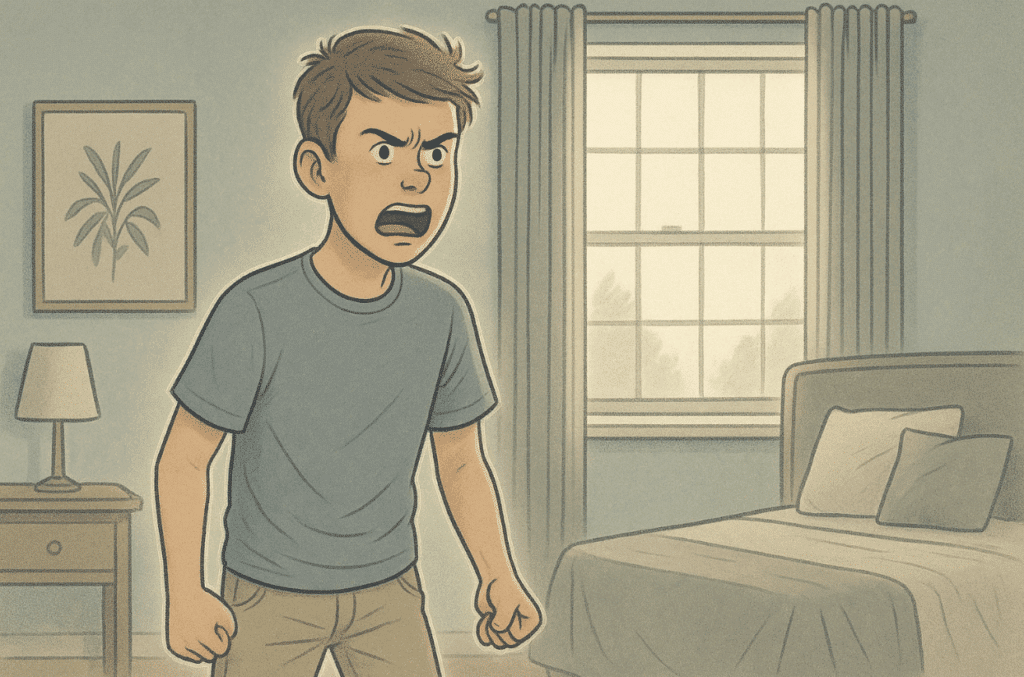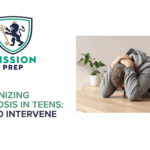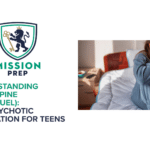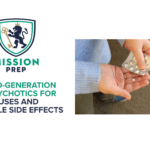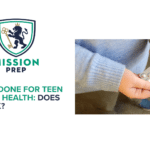Key Takeaways
- Early intervention for teen psychosis can significantly improve outcomes and potentially prevent the development of more serious mental health conditions.
- Warning signs of psychosis in teens include social withdrawal, declining academic performance, confused thinking, and changes in sleep patterns.
- Psychosis symptoms differ from typical teen behavior in their persistence, severity, and impact on daily functioning.
- Many teens experiencing early psychosis symptoms try to hide them due to confusion, fear, or embarrassment.
- Mission Prep Healthcare provides specialized support for adolescents showing early signs of psychosis through evidence-based interventions including individual therapy, family support, and personalized treatment plans.
Teen Psychosis: Often Missed Warning Signs
Psychosis doesn’t typically appear suddenly or dramatically. Instead, it develops gradually through what mental health professionals call the “prodromal phase,” a period where subtle signs appear before full psychotic symptoms develop. This phase can last anywhere from several months to years, providing a critical window for intervention.
Studies indicate that approximately 3 in 100 young people will experience psychosis at some point in their lives, with many cases beginning during the teenage years. What’s concerning is that these early warning signs are frequently dismissed as typical teenage behavior or attributed to stress, or just “going through a phase.”
Mission Prep Healthcare specializes in mental health treatment for teens aged 12-17, offering residential and outpatient programs for anxiety, depression, trauma, and mood disorders. Our therapies include CBT, DBT, EMDR, and TMS, tailored to each adolescent’s needs.
With a structured, supportive environment, we integrate academic support and family involvement to promote lasting recovery. Our goal is to help teens build resilience and regain confidence in their future.
What Is Teen Psychosis?
Teen psychosis involves a loss of contact with reality. It’s characterized by significant changes in perception, thinking, and behavior that make it difficult for the person to distinguish between what’s real and what isn’t.
While psychosis can be a symptom of several conditions, including schizophrenia, bipolar disorder, or severe depression, the underlying experience involves a fundamental disruption in how the brain processes information.
Different From Normal Teen Behavior
Teenagers often wonder how to differentiate between typical teenage moodiness and potential psychosis. The key differences lie in persistence, severity, and functional impact.
Normal teen behavior might include occasional mood swings, trying on different identities, or temporary withdrawal during stressful periods. Psychotic symptoms, however, represent a significant departure from your baseline behavior, persist over time, and notably interfere with your ability to function in daily life.
Early Warning Signs
1. Mood and Behavior Changes
One of the earliest and most common signs involves notable shifts in your emotional state and behavior patterns. You might notice increased irritability, anger, anxiety, or depression that seems disproportionate to circumstances.
Some teens become increasingly suspicious of others or develop an unusual preoccupation with religion, philosophy, or supernatural topics that wasn’t present before. Sleep disturbances often emerge, including difficulty falling asleep, staying asleep, or reversed sleep-wake cycles where they’re up all night and sleep during the day.
You might also notice decreased emotional expression, where you experience emotional flatness or disconnection from situations that would typically evoke a response.
2. Social Withdrawal
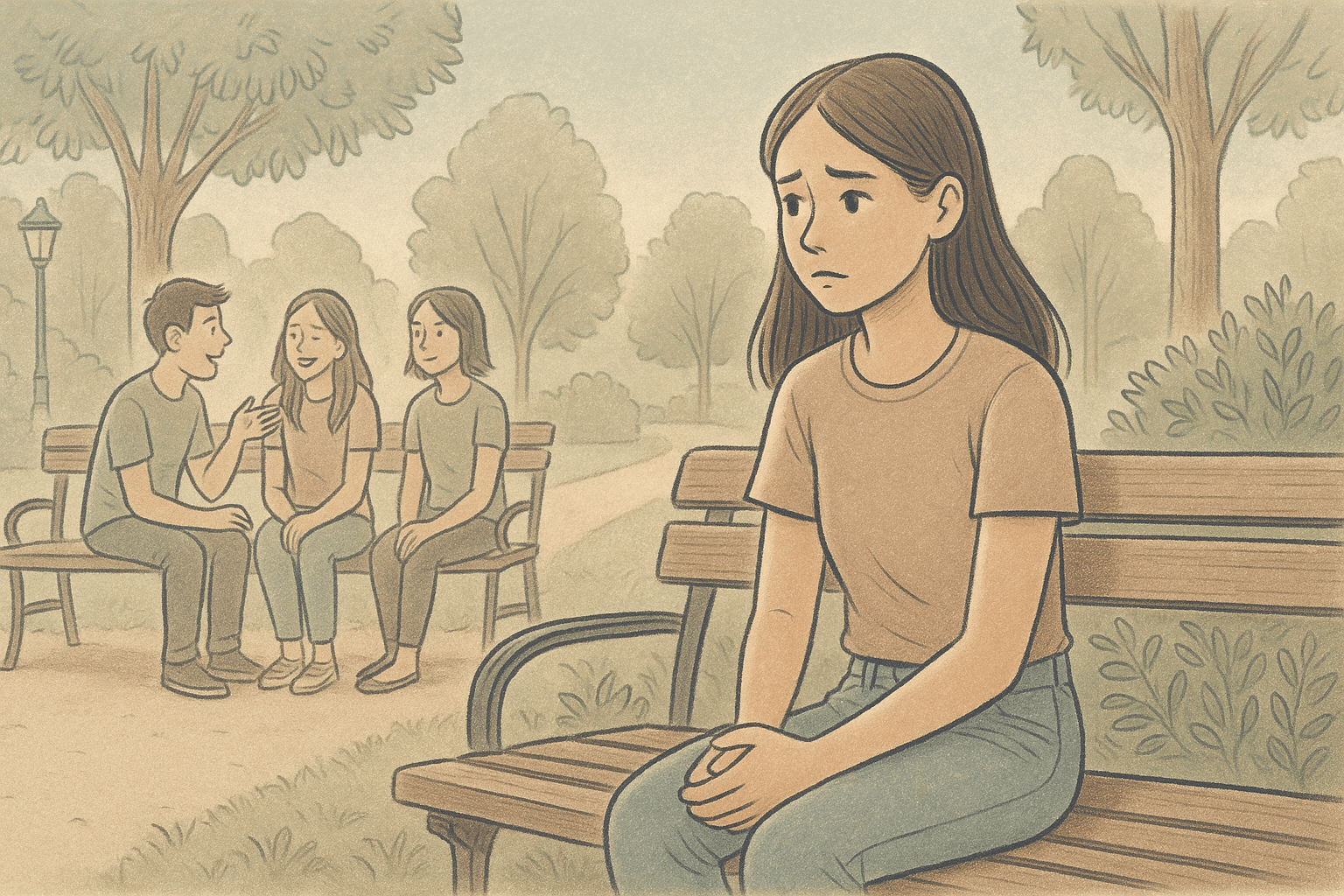
A particularly telling sign involves progressive social isolation and withdrawal from previously enjoyed activities and relationships.
You might begin avoiding friends, dropping out of sports or clubs you’ve once loved, or spending excessive time alone in your room. This withdrawal often happens gradually, making it easy to miss until the isolation becomes significant.
Many teens experiencing early psychosis report a growing sense that something is “off” about their interactions with others. They often feel increasingly uncomfortable in social situations or develop paranoid thoughts about others’ intentions. This discomfort can lead to avoidance behaviors that further isolate them from potential support networks.
3. Confused Thinking
Changes in thought processes represent another crucial warning sign. You might experience difficulty concentrating on schoolwork or conversations, or might struggle to organize your thoughts coherently.
Your speech might become vague, circumstantial, or include unusual word usage. Some teens develop magical thinking patterns, making connections between unrelated events or believing in special powers or abilities. Decision-making abilities often become compromised, with teens having trouble with even simple choices that were previously manageable.
4. Declining Personal Hygiene
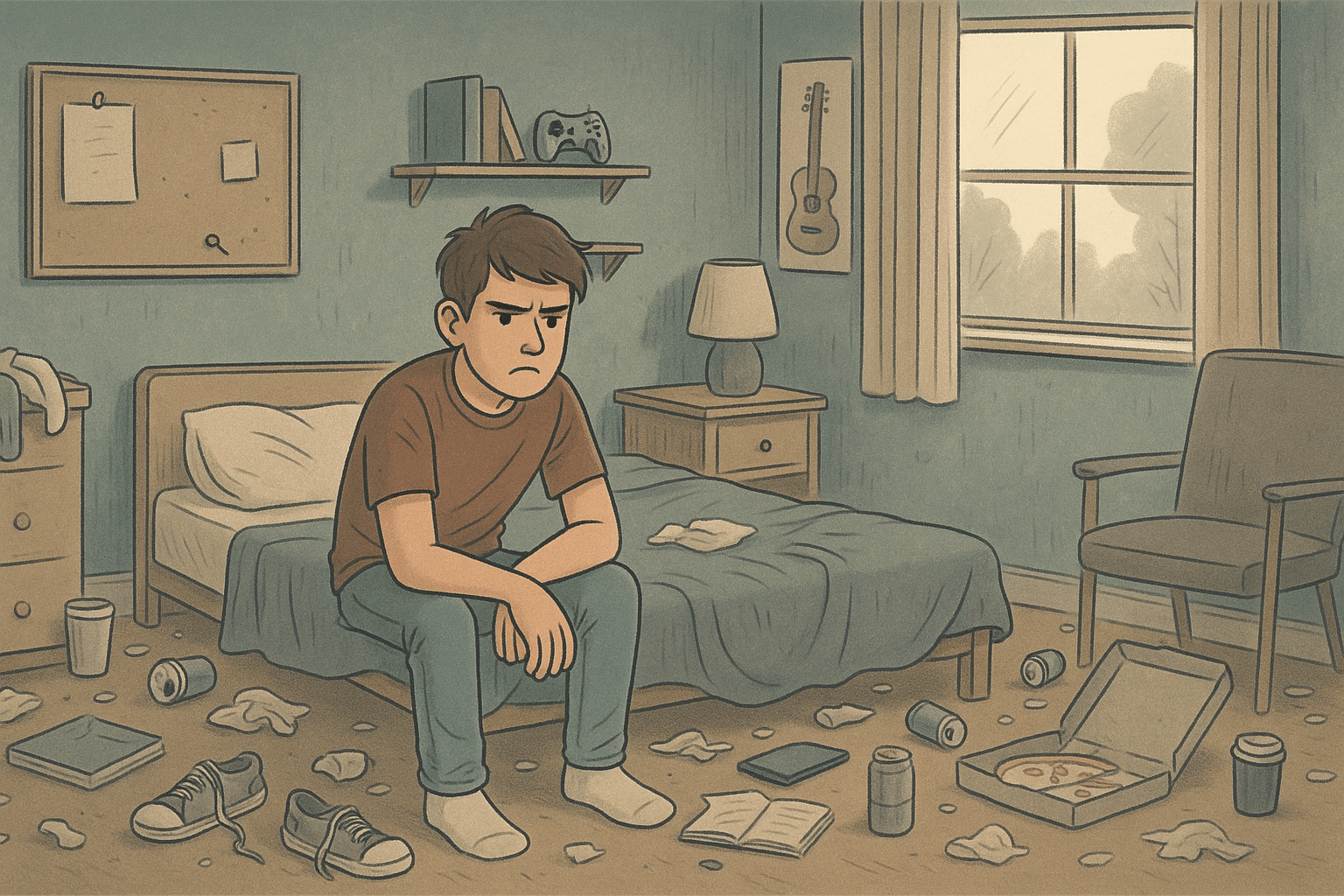
A noticeable decrease in self-care and personal hygiene often accompanies early psychosis.
You might suddenly stop showering regularly, brushing your teeth, or changing clothes. This change typically represents more than typical teenage messiness. It’s a significant departure from your previous habits and can indicate either a loss of awareness about social norms or diminished energy and motivation.
This decline in self-care reflects broader motivational challenges that often accompany early psychosis. Activities that require initiation and follow-through become increasingly difficult as cognitive functions become compromised.
5. School Performance Problems
Academic difficulties frequently emerge as cognitive functions become affected. You might notice your grades dropping unexpectedly, assignments going incomplete, or increasing difficulty with subjects you’ve previously handled well.
Many teens experiencing early psychosis have trouble organizing their thoughts, maintaining attention, and processing information efficiently. These cognitive symptoms can significantly impact academic performance even before more obvious psychotic symptoms emerge. The resulting academic failures can further damage self-esteem and increase stress, potentially accelerating symptom progression.
Advanced Psychosis Symptoms
1. Hallucinations
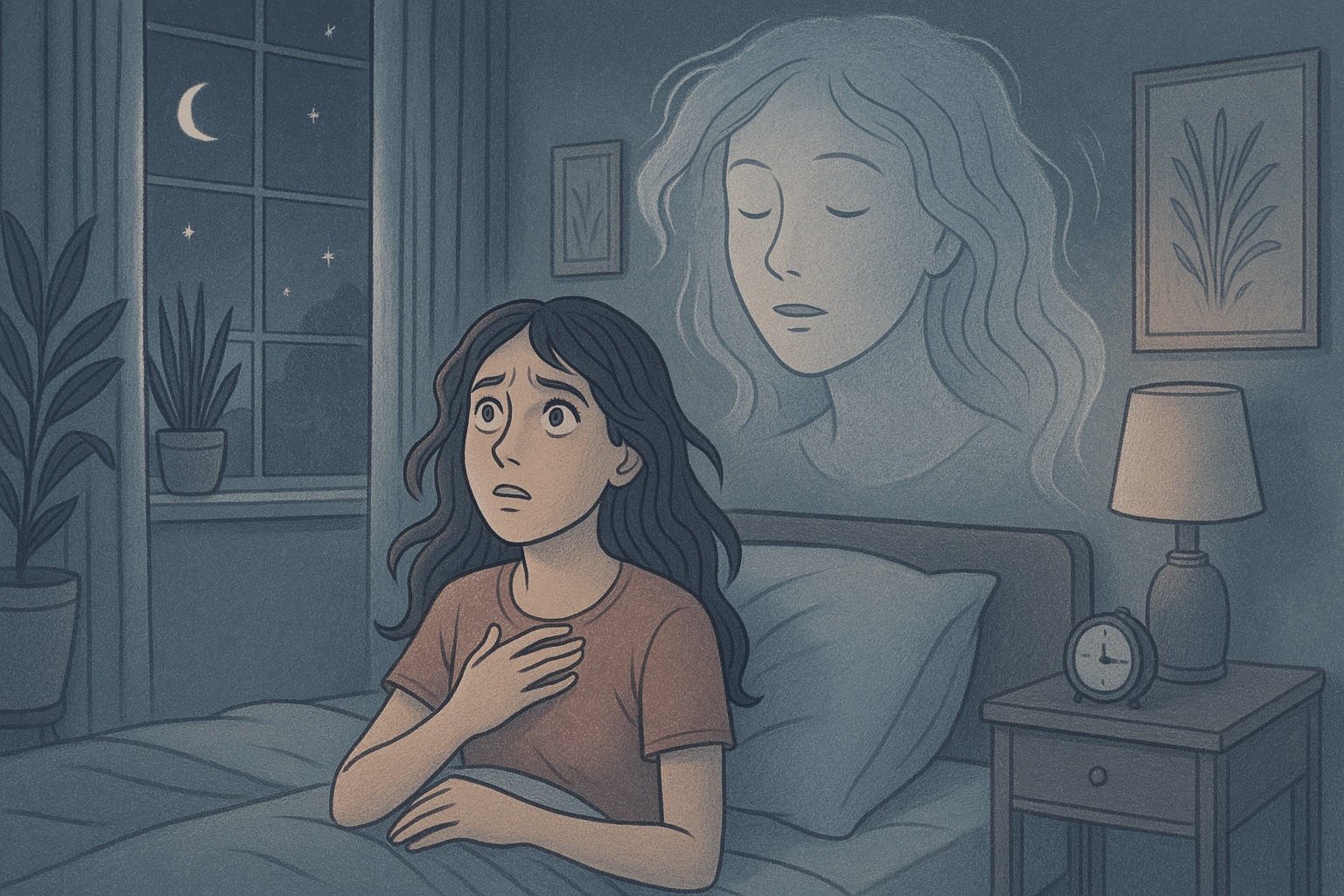
Hallucinations involve perceiving things that aren’t actually present and are among the most recognizable symptoms of psychosis.
You might experience hearing voices that others don’t hear, often critical, commanding, or threatening in nature. Some teens experience visual hallucinations (seeing things that aren’t there), tactile hallucinations (feeling sensations like something crawling on their skin), or olfactory hallucinations (smelling odors others can’t detect).
These experiences feel completely real to you, which can make them particularly frightening and confusing.
2. Delusions
Delusions are fixed false beliefs that remain despite evidence to the contrary. You might develop paranoid beliefs that others are watching you, plotting against you, or trying to harm you. Some teens develop grandiose delusions about having special powers or a special mission.
Others might become convinced that their thoughts are being broadcast to others, that they’re receiving special messages from the TV or internet, or that their thoughts are being inserted or removed from their mind. These beliefs can be terrifying for teens and difficult to address because logical explanations rarely help.
3. Disorganized Speech
As psychosis progresses, your speech patterns might become increasingly disorganized. You might jump rapidly between unrelated topics, create word salads (jumbled phrases that lack coherent meaning), or speak in ways that are difficult to follow.
Some teens develop neologisms (made-up words) or use existing words in unusual ways. These communication difficulties reflect the underlying thought disorder that characterizes psychosis and can make it challenging to maintain meaningful conversations with your teen.
When To Get Help
Knowing when to seek professional help can be challenging, especially when symptoms develop gradually or are inconsistent. The general guideline is that when behaviors persist for more than two weeks, interfere with daily functioning, or cause significant distress, it’s time to consult with a mental health professional.
Emergency Warning Signs
Some situations require immediate intervention. If you have thoughts of harming yourself or others, experience severe confusion or disorientation, or are unable to perform basic self-care functions, seek emergency mental health services immediately.
Other urgent warning signs include complete social withdrawal, severe paranoia that prevents normal functioning, or rapidly worsening symptoms that dramatically impact daily life. Remember, early intervention during a crisis can prevent more serious outcomes and provide a faster path to appropriate treatment.
Finding The Right Professional
For evaluating potential psychosis, seek professionals with specific expertise in adolescent mental health and psychotic disorders. Child and adolescent psychiatrists, psychologists specializing in serious mental illness, or clinicians associated with early psychosis intervention programs are ideal.
Many communities now have specialized early psychosis clinics designed specifically to identify and treat young people showing warning signs. These programs often provide comprehensive assessment and can distinguish between psychosis and other conditions that might present similarly, such as severe anxiety, trauma responses, or neurological conditions.
Mission Prep: Your Partner in Teen Mental Health Recovery

At Mission Prep, our specialized team is dedicated to providing the comprehensive, compassionate care you need.
Mission Prep’s evidence-based treatment programs are specifically designed for adolescents experiencing psychosis, offering individualized therapy approaches including Cognitive Behavioral Therapy, Dialectical Behavior Therapy, and family support services.
We recognize that each teen’s experience is unique, which is why we tailor our treatment plans to address both the immediate symptoms and the underlying factors contributing to your teen’s condition.With flexible program options including inpatient, outpatient, and intensive outpatient care, we meet you where you are in your recovery journey.
Our experienced medical and therapeutic teams work collaboratively to help teens regain control, develop healthy coping strategies, and build the foundation for long-term mental wellness. Don’t wait for symptoms to worsen; early intervention can make all the difference. Contact Mission Prep today to learn how our specialized adolescent mental health services can help your teen reclaim their future and thrive.
Frequently Asked Questions
Can stress alone trigger psychosis in my teen?
Yes, stress can trigger or worsen psychotic symptoms in vulnerable individuals. The stress-vulnerability model suggests that teens with genetic predisposition have lower stress thresholds, and when exceeded, psychotic symptoms may emerge. Common stressors include academic pressure, social conflicts, family discord, and traumatic experiences.
How long does treatment for teen psychosis typically last?
Treatment duration varies significantly depending on individual factors and symptom severity. Brief psychotic episodes may require a few months of treatment, while conditions like schizophrenia typically need 1–2 years of intensive treatment, with many requiring longer-term support. Early intervention generally produces better outcomes and potentially shorter treatment periods.
Will my teen need to take medication forever?
Medication duration depends on the underlying cause, treatment response, and individual risk factors. Some teens with brief psychotic disorders may need medication only temporarily, while others with conditions like schizophrenia may benefit from longer-term medication. Any medication changes should always be made gradually under professional medical supervision.
How can I tell if my teen’s behavior is normal adolescent development or early psychosis?
Normal teen behavior includes occasional mood swings and temporary withdrawal during stress, but typically doesn’t persist or significantly interfere with daily functioning. Psychotic symptoms represent a significant departure from your teen’s baseline behavior, persist over time, and notably impact their ability to maintain relationships, perform academically, or engage in previously enjoyed activities.
What makes Mission Prep’s approach to teen psychosis treatment unique?
Mission Prep specializes in evidence-based treatments specifically designed for adolescents, offering individualized care plans that include Cognitive Behavioral Therapy (CBT), Dialectical Behavior Therapy (DBT), family therapy, and comprehensive support services. Our programs address both primary and secondary psychosis while providing the specialized attention teens need in inpatient, outpatient, and intensive outpatient settings.


